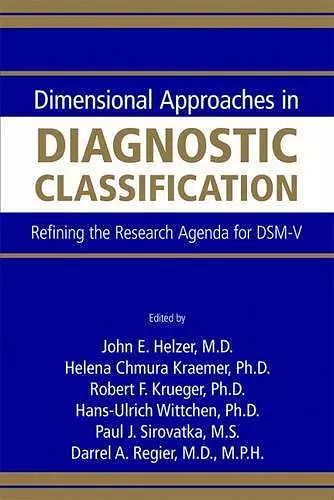Dimensional Approaches in Diagnostic Classification
Refining the Research Agenda for DSM-V
Paul J Sirovatka editor Darrel A Regier editor John E Helzer editor Helena C Kraemer editor Robert F Krueger editor Hans-Ulrich Wittchen editor
Format:Paperback
Publisher:American Psychiatric Association Publishing
Published:13th Jun '08
Currently unavailable, our supplier has not provided us a restock date

Since its initial publication more than 50 years ago, the DSM has systematized the complex intellectual and clinical process of diagnosing mentally ill persons through the use of categories and classification. The manuals have provided a consistent diagnostic language for clinical work, research, and teaching; have established a common international taxonomic standard; and have provided psychiatrists with a means of communicating with patients and the public. With a new iteration of the DSM on the horizon, the APA has initiated a multiphase research review process designed to set the stage for the fifth revision, due to be published in 2013.
This book brings together the most promising research presented at the conference "The Future of Psychiatric Diagnosis: Refining the Research Agenda," which was convened by the APA, in collaboration with the World Health Organization and the U.S. National Institutes of Health. Conferees were challenged to go beyond the current categorical definitions set forth in DSM-III and DSM-IV and suggest ways of incorporating more quantitative, dimensional concepts into DSM-V. The resulting work:
• Addresses the challenge of creating dimensional measures that are compatible with existing categorical definitions and do not unduly disrupt clinical practice
• Applies a dimensional approach to a broad range of diagnoses, including substance dependence, major depressive episode, psychosis, anxiety disorders, developmental psychopathology, and personality disorders
• Facilitates the development of broadly agreed upon criteria that researchers worldwide can use in planning and conducting future research exploring the etiology and pathophysiology of mental disorders
• Identifies and encourages the empirical research necessary to allow informed decision making regarding deficiencies acknowledged in DSM-IV
• Promotes international collaboration with the objective of eliminating the remaining disparities between DSM-V and the International Classification of Diseases Mental and Behavioural Disorders Section, the next edition of which is due to be released in 2014.
The book's painstaking scholarship and thoughtful conclusions should stimulate interest in finding new ways of combining categorical and dimensional approaches in psychiatric nosology. Clinicians and researchers in the United States and the international psychiatric community will discover, in these pages, the beginnings of a new, quantitative methodology that represents the next stage in the evolution of DSM.
This informative new book details the dimensional approach to psychiatric nosology. Clinicians actually do not treat patients according to the DSM categories (or the diagnostic criteria) but rather use the heuristic of target symptoms. Clinicians and researchers who are interested in understanding the rationale for the modifications proposed in the next iteration of the DSM should read this book.
* Doody Enterprises *Students, researchers, and clinicians alike will find this text useful.
* PsycCRITIQUES *Dimensional Approaches in Diagnostic Classification, by Helzer and colleagues, has a timely focus on refining the research agenda for DSM-V, advocating a stronger dimensional emphasis to our categorically structured current DSM -IV.
-- James H. Shore, MD * Journal of Clinical PsychiatISBN: 9780890423431
Dimensions: 229mm x 152mm x 10mm
Weight: 281g
164 pages